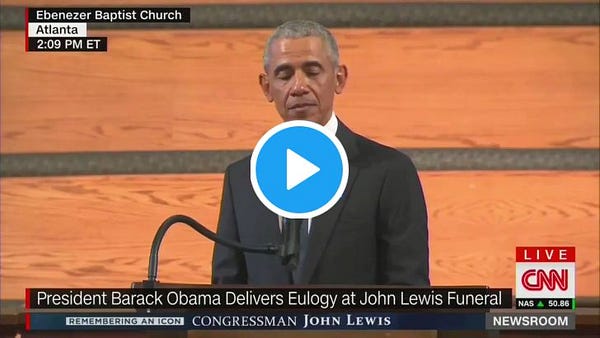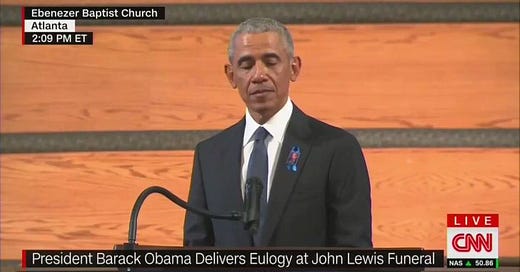How to Win the Message War on Democracy
Republicans are going to come after us over expanding voting, eliminating the filibuster, and fixing the court, here's how we fight back
The biggest dividing line in the Democratic primary was not between left and center. It was not about Medicare for All vs. Medicare for Some. It was about the state of our democracy. The primary was ultimately a contest between those that believe Trump is an aberration and those that believe that our democracy is under a threat that goes well beyond Trump. After South Carolina and Super Tuesday, the primary felt like a resounding loss for the folks – like myself – in the latter camp.
The only candidates that remained from a field of more than twenty were Joe Biden and Bernie Sanders – longtime Senators that were very resistant to structural fixes like eliminating the filibuster and reforming the courts.
But somewhat under the radar things have been changing. The radical shift in the political firmament culminated in Barack Obama’s passionate eulogy for Congressman John Lewis.


By guaranteeing that every American citizen has equal representation in our government, including the American citizens who live in Washington, DC, and in Puerto Rico. They’re Americans. By ending some of the partisan gerrymandering. So that all voters have the power to choose their politicians, not the other way around. And if all this takes eliminating the filibuster, another Jim Crow relic, in order to secure the God-given rights of every American, then that’s what we should do.
Obama’s remarks was the latest in a rapid series of events of that have placed structural democratic reform at the center of the party’s agenda:
Joe Biden promised one of his first acts as President would be to introduce a massive voting rights bill named after John Lewis.
In June, all but one member[1] of the Democratic House passed a bill to make Washington, DC a state.
In that same month, two progressive New York Democrats – Jamaal Bowman and Mondaire Jones – won historic primary victories as supporters of a plan to expand the Supreme Court. Even more stunningly, the Democratic Party Platform – a document that generally abides by the Hippocratic oath – called for “structural change” of the Federal courts.
Hours after Obama called the filibuster “a Jim Crow relic,” Bernie Sanders officially came out for eliminating the filibuster. Sanders’ endorsement capped off months of momentum for elimination of the filibuster. Even Joe Biden, a filibuster defender as recently as February, expressed openness to getting rid of it if McConnell was too “obstreperous.”[2]
The realization among Democratic leaders that Trump didn’t break our democracy, but that our broken democracy gave us Trump is a critical first step to repairing the wreckage and building back better. If we don’t remove barriers to voting, expand the franchise, make the Senate more democratic, and unrig the courts, it doesn’t matter how many elections we win, Republicans will still control the levers of power in this country.
But convincing Democratic elected officials was the easy part (and it wasn’t that easy), the next step is winning the broader message war. Republicans are undoubtedly licking their chops at this turn of events. On the defensive for enabling an incompetent and corrupt President that has mishandled a pandemic and wrecked the economy, they are desperate for a new narrative. And nothing gets them fired up like the prospect of losing political power.
How do we convince the majority of the country that improving democracy is more than a liberal power grab?
As you might imagine, I have a few thoughts:
Make the Argument
To paraphrase Wayne Gretzky, you lose 100 percent of the arguments you don’t make. For far too long, Democrats have refused to make persuasive political arguments in support of political reform. We have also failed to make compelling arguments against Republican efforts to rig democracy in their favor. There are many reasons for this. There has been a sense that talking about “process” issues distracts from the kitchen table[3] issues that pollsters constantly remind us voters care most about. Democrats have also looked at polling on Voter ID laws which was supported by 80 percent of voters as recently as a 2016 Gallup poll, and decided to fight back in the court of law instead of the court of public opinion. I’m sympathetic to the desire avoid a fight on an 80-20 issue, but that is also a way to guarantee that it is always an 80-20 issue. Arguments for fixing our democracy need to be a core part of the Democratic message or the effort will be demagogued to death. It is imperative that we explain why expanding voting rights, eliminating the filibuster, fixing gerrymandering, making DC a state, and fixing the court are necessary to addressing those kitchen table[4] issues.
“They Did it First” is Not an Argument
The irresistible tractor beam of the “both sides” narrative will compel otherwise rational reporters to equate Democratic efforts to fix our democracy with Republican efforts to break it. In this demented DC view, stealing votes and winning votes are opposite sides of the same coin. Democrats have to aggressively push back against this frame and avoid leaning into it with “eye for an eye” arguments. The democracy agenda – even court expansion – is not retribution for McConnell’s action. Making our democracy more accessible for more people is the right thing to do. It is consistent with the legacy of John Lewis and well within the tradition of the Women’s suffrage and Civil Rights movements. We should wrap our agenda in the rhetoric and imagery of those historic fights, not McConnell’s deeds.
Identify the Villains
The flip side of arguing why we should fix our democracy is explaining why Republicans spend so much time and money making it harder for people to vote. “Mitch McConnell is an evil asshole that hates democracy[5]” is an argument that I personally find compelling but may not work with the broader population.[6]
The best political arguments are stories with a “who,” a “what,” and a “why.” Voters have an inherent skepticism about the motivations of politicians. They assume that both parties take steps to preserve their political power, because that’s “what politicians do.” Therefore, it absolutely critical that Democrats explain why Republicans are rigging our democracy and who benefits from their efforts. The best message centers on a narrative about how corporations and special interests profit from taking political power away from the American people. Here is one way to make that case:
The Republican agenda of tax breaks for corporations and Wall Street paid for by cutting Medicare, raising healthcare premiums, and gutting education is opposed by bipartisan majorities of Americans. Voter suppression, gerrymandering, the filibuster and rigging the courts are a strategy to ensure that the corporations, lobbyists and Wall Street banks that fund the Republican Party continue to call the shots in America. Republicans are simply trying to protect their unpopular special interest agenda.
Don’t Be Afraid to be Bold
Back in 2019, Mitch McConnell melted down on the Senate floor because Democrats had the audacity to push to make Election Day a Federal holiday[7] — an incredibly modest, commonsense proposal. McConnell’s rage was evidence of two key points: Mitch McConnell has a deep-seated hatred for democracy and it doesn’t matter whether Democrats push for modest or radical reforms, Republicans will react with the same alarmist rhetoric. This knowledge should be freeing. It gives us permission to fight for what we believe in without reverse engineering our positions based on performative Republican rage.
Every issue that Democrats care about depends on fixing our democracy. That only happens if we win the messaging war. It can be done, but it’s going to take work.
[1] Come on Colin Peterson…get with the program. I don’t think the Republicans are going to be nicer to you because you voted against enfranchising 700K American citizens. [2] Conditioning support on whether McConnell is obstreperous is a de facto endorsement in my book. You can set your watch to it. [3] This is a terribly stupid term that everyone in politics – apparently including me – keeps using without ever examining what it means. [4] I did it again. I think I have to deposit money into the “Trope Jar.” [5] This argument is enjoyable and true! [6] Because they do not know who Mitch McConnell is, not because they don’t think he is an evil asshole. To know him is to know his evil assholery. [7] Proving the point in the previous footnote.




Yuge fan of yr footnotes (yes I paid full retail for your hardcover book) but if you could figure out how to make them show up on the side instead of at the bottom it would be a whole lot easier to read them in time to laugh before losing the rhythm of your prose.
Thanks so much for this Dan! It's great to read deeper analysis and to hear your thoughts on how campaigns should speak to voters in the next crucial months.